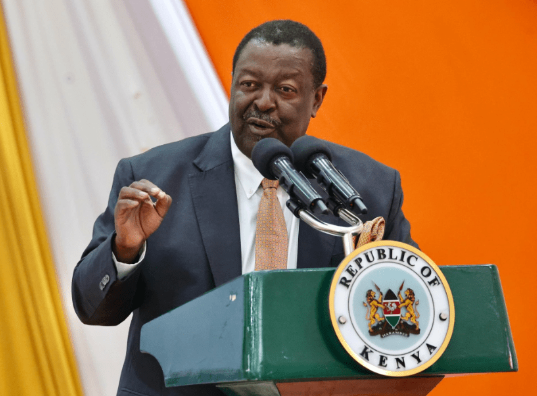Prime Cabinet Secretary and Cabinet Secretary for Foreign & Diaspora Affairs Musalia Mudavadi is scheduled to travel to Windhoek, Namibia, for the Mid-Term Review (MTR) meeting addressing various bilateral issues.
In a statement issued on Sunday, September 8, 2024, Jacob Ng’etich, Mudavadi’s Press Service Director, announced that Mudavadi will meet with Namibian Vice President Netumbo Nandi-Ndaitwah and Minister for International Relations and Cooperation Peya Mushelenga.
“The Prime Cabinet Secretary aims to enhance collaborations, review several business and diplomatic protocols, and advocate for the establishment of a Namibian Diplomatic Mission in Nairobi,” Ng’etich said.
Kenya and Namibia initially signed a General Agreement on Cooperation on June 2, 1992, which established the Kenya-Namibia Joint Commission of Cooperation (JCC) and included agreements on agriculture, aviation, health, and education.
“Both countries are signatories to the Africa Continental Free Trade Area(ACFTA), which they have ratified. In addition, they are Members of the COMESA-SADC-EAC Tripartite Free Trade Area which is meant to accelerate economic integration for the people of the Eastern and Southern African region. On the trip, Mudavadi will push for improving Kenya-Namibia trade ties,” he added.
Ng’etich says for over a decade, the balance of trade has been in favour of Namibia to the tune of Ksh11.16 million, where Kenya exports an average of Ksh106.31 million of goods, while it imported goods worth Ksh117.76 million from Namibia.
“Although Namibia has a relatively small population, thus making it a small market for retailers, it is rated the 26th most important new market for retailers, and the second most important in Africa after Botswana, per the Global Retail Development Index 2013 by AT Kearney,” Ng’etich said.
“Also, it (Namibia) normally imports about 50 per cent of its cereal requirements.”
Mudavadi’s mission
Ng’etich stated that Mudavadi will work to ensure Kenyans benefit from the strong diplomatic relations and visa-free protocols to invest in the cereal sector.
Kenya’s exports to Namibia include pain relief medications, syringes, electrical equipment, radar apparatus, automatic data processing machines, petroleum products, clothing, water, and roses. Conversely, Namibia’s exports to Kenya consist of table salt, unwrought zinc, alcoholic beverages, mollusks, ethanol, and clothing.
“The products with the greatest potential for export to Namibia include black tea and coffee. There is also the potential to benchmark and cooperate in the fields of livestock keeping, blue economy, beef and water dam building, and water conservation,” Ng’etich says.
Namibia hosts approximately 1,000 Kenyan expatriates who are predominantly employed in various professional fields such as medicine, nursing, teaching, architecture, building and quantity surveying, aviation, marine, advertising, education, transportation, handcrafts, African clothing sales, engineering, and business.
According to Ng’etich, Kenyan-owned businesses in Namibia encompass advertising agencies, private schools, private hospitals and medical training institutions, engineering and construction firms, architectural consultancy, and information technology services.
“In addition, we have UN staff, pastors, and business people in curios and crafts. The Prime Cabinet Secretary will follow up with Namibia on its promise to give Kenyan business people five-year multiple-entry business visas. This is following Kenyan investors’ concerns about the issuing of business visas to explore investment opportunities in Namibia,” he added.
Kenya and Namibia have established agreements and memorandums of understanding (MOUs) covering various areas, including the abolition of visas, technical cooperation in health, recruitment of health personnel, aviation training, diplomatic training, and youth affairs.
Several draft agreements and MOUs are currently under review, including a Bilateral Air Services Agreement initially proposed in 1993 and reviewed in 1999, as well as an agreement on Ports Matters. According to Ng’etich, these documents are now ready for signing.
“Others at different stages include an MOU on science, technology, and productive innovation between Namibia Airports Company and Kenya Airports Authority, a trade and investment agreement on reciprocal promotion and protection of investments and agriculture, livestock, water, forestry, and fisheries.”
Mudavadi is also expected to explore cooperation with the Namibian government for Kenya Airways to establish direct flights and to secure a fifth freedom landing by KQ for SADC member states.
“He will also push Kenyans to leverage the experience and expertise of the Namibia marine sector, including the blue economy. Mudavadi will also use the opportunity to drum up support for the candidature of the Rt. Hon. Raila Odinga, for the African Union Commission Chairperson position in the February 2025 elections,” Ng’etich says.



